Politics
Nigeria’s gradual descent into autocracy
Published
8 years agoon
By
Olu Emmanuel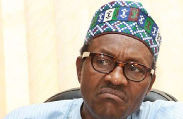
By SUNDAY ODIBASHI
PRESIDENT Muhammadu Buhari is seemingly being confronted with the most challenging temptation of leadership, which relates to making a choice between a leader’s personal belief and advice coming from people around him in the administration of a country, even in organizations. In the current circumstance, President Buhari is facing the dilemma of applying the laws of governance as prescribed by the constitution or subscribing to the idiosyncrasies and personal interpretations of administrative laws emanating from people he appointed into committees providing technical support to his administration.
Until recently, President Buhari has guarded himself consciously to eschew from any form despotism which many stakeholders fear is indelible in his leadership culture. To the consternation of many stakeholders in the polity, the President has shown remarkable adjustment in subscribing to democratic norms since his inauguration and has relatively sustained the opening of the political space for wider participation. He has also endevoured to lead the All Progressives Congress (APC) towards sustaining internal democracy, particularly, at a time the party encountered contradictions in defining what constitutes party supremacy in juxtaposition with the dictatorship of political godfathers.
Paradoxically, the President’s fight against corruption has persistently been generating controversies over perceived political colouration or subtle interference with judicial processes, essentially, on the granting of bails to certain persons under prosecution and the immediate re-arrest of such persons by security operatives under executive supervision. The recurrence of the practice generated sentiments of suspected selectivity in the fight against corruption which, ab initio, virtually all Nigerians supported. The sentiments subsequently degenerated into discordant tones over the motive of the anti-corruption war, suspicions of attempts to crush opposition and associated threats to the sustenance of the country’s developmental democracy.
While certain stakeholders, including the Peoples Democratic Party (PDP) and some elder statesmen, criticize President Buhari on the travail of retired Colonel Sambo Dasuki, National Security Officer (NSA) to former President Goodluck Jonathan, accusing him of tyranny or distortions of the rule of law, a member of the Presidential Advisory Committee on Anti-Corruption, Professor Femi Odekunle, Professor of Criminology, Ahmadu Bello University, let the cat out of the bag, providing clue to the source of the perceived misuse of power in the fight against corruption, by declaring his aversion to immoderation of the rule of law.
Odekunle was gathered to have expressed his opposition to a system where the rule of law is not moderated. In his view, not moderating the rule of law or democracy is tantamount to the transcendence of individual interest over public interest.
Odekunle had contended, in part: “one of the problems we have in this country is that we put the interest of the individual above the interest of the collective. As a professional criminologist, I am not for unmoderated democracy, I’m not for unmoderated rule of law in which the rights of the individual will be so hyperbolised and override those of the collective.” There are indications that Odekunle appeared to be overwhelmed by frustrations arising from political and state actors who loot public treasuries entrusted to them for good governance and succeed in securing skillful lawyers to escape justice, in terms of punishment.
“If a man is accused of stealing N1 billion, and he goes to court and the Senior Advocates of Nigeria (SANs), with all their shenanigans and technicalities, using the Constitution, to say you have committed a bailable offence whereas the consequences are more than what is bailable; then, you are able to get bail. Then, tomorrow, we find that you have stolen another billion naira, that is another offence and, therefore, you should be arrested. To me, once you get a bail for a particular offence, that does not mean you cannot be arrested for another offence… the government has even been very gentle and constrained in doing its job and dealing with this monster of corruption,” Odekunle had explained in demonstration of his frustration. He had further lamented: “If you know the damage that has done to us morally, psychological, socio-culturally and financially, image wise, you will not be going into this discussion about the human rights of certain people who are actually ruining us. If we don’t make examples of these characters, sooner than later, our future and that of our children are jeopardised.”
Odekunle, however, admonished that he did not mean that “peoples’ rights should not be respected, but … in respecting peoples’ rights, you must respect the rights of the collective.”
Meanwhile, Odekunle doesn’t seem to be comfortable with multiplicity of decision making platforms which democracy provides. Such foundation of thought, perhaps, led to his conclusion and paradigm shift from the rule of law to the rule of man, according to his conjectures on legal proceedings in prosecuting corruption cases.
Some stakeholders were of the view that Odekunle’s phobia may engender greater risk or damage to the country’s developmental democracy. They emphasized that such proposition would revert the country to the ancien regime of weak institutions and strong man, a regime structure amenable to Machiavellian belief that the king can use all forces at his behest to achieve public goals; giving the people the consolation that “the end justifies the means.” Many stakeholders believe this is a recipe to anarchy and retrogression to the state of nature.
Some have argued that construing democracy from the British School simply as constitutional government or the American School which emphasizes the people as the centre piece of democracy, moderating democracy or the rule of law eliminates the probability of expectations from governance or the administration of justice. This, they said, translates to sudden transition from democracy to autocracy, where citizens’ rights are restricted; adding that, moderating the rule of law or democracy also destroys collective interests when public institutions lose their efficacy. They warned that the President should not be made to believe that this the right way to take.
It was articulated that the transcendence of the public realm over the private realm, which Odekunle seems to project, is a function of the laws of the state to which every citizens and institutions of the state subscribe. The fear of the Presidential Advisory Committee on Anti-Corruption, it was identified, simply relates to noticeable loopholes in prosecution of corruption cases, improper investigations, weakness of applicable laws under which an accused is being prosecuted and perhaps, corruption in the judiciary. These issues were said to have nothing to do with the rule of law or democracy. Rather, the Committee has a duty to look inwards and seek how these issues can be rectified or strengthened. There were suggestions that either some of the laws should be reviewed or the prosecutors need more training or the judiciary should be strengthened to resist the temptation of succumbing to bribery, than moderating the rule of law or democracy.
You may like
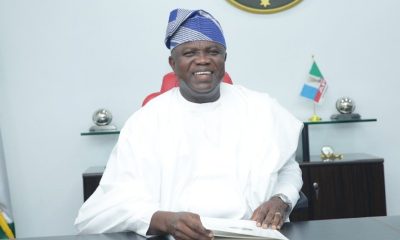

APC Stakeholders push for Ambode’s comeback in 2027
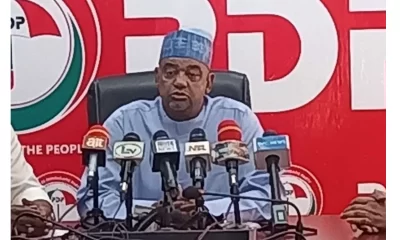

Damagum survives, retains position as acting chairman of PDP
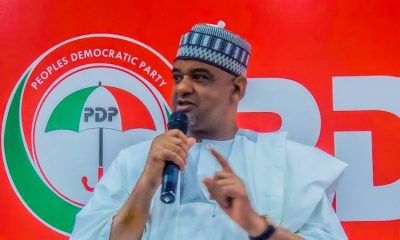

PDP NWC passes a vote of confidence on Amb. Damagum
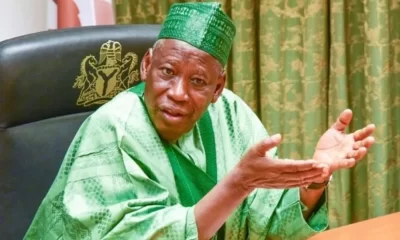

Court affirms Ganduje’s suspension as APC national chairman
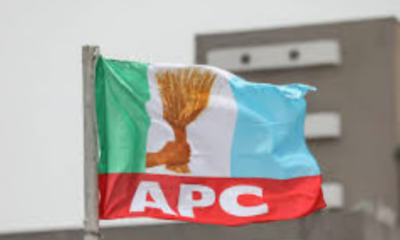

Relationship between Oyetola, Omisore remains cordial — Osun APC
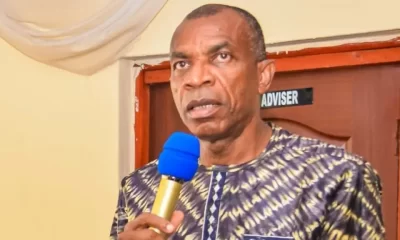

Just in: Abducted Edo PDP chairman, Aziegbemi regains freedom
Trending

 Football2 days ago
Football2 days agoGuardiola advised to take further action against De Bruyne and Haaland after both players ‘abandoned’ crucial game

 Business1 week ago
Business1 week agoRecapitalisation: Zenith Bank to raise funds in international capital market

 Covid-191 week ago
Covid-191 week agoBritish legislator demands Bill Gates, other ‘COVID Cabal’ faces death penalty

 Aviation4 days ago
Aviation4 days agoNCAA suspends three private jet operators for engaging in commercial flights

 Latest6 days ago
Latest6 days agoIsrael pounds Hezbollah with airstrikes after Iran attack

 Featured5 days ago
Featured5 days agoRelationship between Oyetola, Omisore remains cordial — Osun APC

 Aviation3 days ago
Aviation3 days agoDubai international airport cancels flights as flood ravages runway, UAE

 Comments and Issues2 days ago
Comments and Issues2 days agoNigeria’s Dropping Oil Production and the Return of Subsidy

